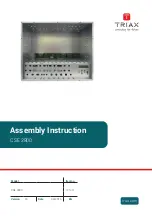
Generic TT31 Minor Modification
21 February 2008
SUP/TT31/001
Issue
1.6
______________________
Trig Avionics Limited
Page 10
present in an aircraft without DME. It is also not strictly necessary to connect the lighting bus, and the
previous installation may have omitted these contacts.
The only required contacts for basic functionality are the power contact, the two ground contacts, and
the 9 lower altitude encoder inputs.
Pin N – the lower left pin when viewed from the front – is not normally used in a KT76A or KT78A
installation and should be empty. Pin N is used for bench testing of the TT31 and MUST NOT be
connected in the aircraft – it is marked “Do Not Connect” in the diagram above. Confirm that there is
no connection to pin N before continuing with the installation.
4.4.6.3 Inspect Antenna Connector
Using the inspection light, examine the coaxial connector at the rear of the tray. Check that the
connector is secure and that all the leaf contacts on the outer surface are intact.
4.4.7
Non KT76A Replacement
4.4.7.1 Replace Interface Connector
Before rewiring the connector, establish the relationship between pin positions on the transponder
being removed and the TT31, referring to the wiring diagram in section 3.5.
Rewire the crimp connector in accordance with the TT31 installation manual.
4.4.7.2 Inspect/Replace Antenna Connector
Inspect the antenna connector removed from the previous transponder tray. Although most
transponders use compatible blind-mate BNC connectors it may be necessary to replace the existing
antenna connector if it is damaged or incompatible with the TT31.
4.4.7.3 Replace Mounting Tray
Fit the connectors to the TT31 mounting tray and install the tray in accordance with the TT31
installation manual.
4.4.8
Install TT31
Install the TT31 transponder. Check that the camlock is in the correct orientation before inserting the
TT31 in the tray; tighten with the Allen key. Do not over tighten.
4.4.9
Commission Transponder
Apply power. The TT31 should light up and – assuming this is the first installation – will
automatically start the installation setup process.
Continue with the setup process by entering the Mode S address and other parameters in accordance
with the TT31 Installation Manual.
4.5 Post-installation Test
The following post-installation test procedure shall be followed.
4.5.1
Equipment Function
Verify that the proper mechanical and electrical connections have been made. Exercise the setup and
test software to confirm correct operation of the aircraft lighting bus input (where fitted).




































